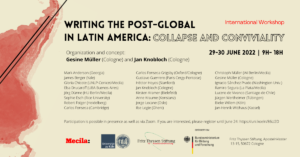Hybrid
Organization and concept:
Gesine Müller (Cologne) and Jan Knobloch (Cologne)
Latin American literatures in the 21st century are marked by the increasing exhaustion of the global project. The conference proposes to explore the plurality of this post-global experience by analyzing representations of collapse and conviviality in contemporary Latin American literature (2001–2021). The two concepts exist in a productive tension: while representations of collapse emphasize the vulnerability of natural and social systems, conviviality is directed towards the possibility of living together in difference.
Literature, quite unlike any other medium, is perfectly suited to sketching out and enacting scenarios of such tension under fictional conditions. Literary fictions can imagine new ways of living together – and thereby contribute to solving problems related to convivialities of the future – if we treat fiction as a heuristic form, the basis of a “sociología fantástica” (Marcelo Cohen) that expands the possibilities of the thinkable. Collapse is the moment when conviviality is revealed to be fragile and endangered. At the same time, however, it also opens up a post-catastrophic future in which social reconfigurations and new models are possible.
Participation is possible in presence as well as via Zoom.
If you are interested, please register until June 24: https://uni.koeln/86U2D

29 Juni 2022
08.30-09.00: Arrival of the participants
09.00-09.15: Welcoming, Barbara Potthast
09.15-09.30: Introduction, Gesine Müller/Jan Knobloch
The Globalized in Post-Global Times: Markets, Circulation, and Resistance
09.30-09.50: Gustavo Guerrero (Paris Cergy-Pontoise): “Post-autonomía y post-compromiso, un debate inacabado?”
09.50-10.10: Gloria Chicote (UNLP-Conicet/Mecila): “Post global y popular: intersecciones posibles en la literatura latinoamericana”
10.10-10.30: Gesine Müller (Cologne): “World Creation between Collapse and Conviviality. Fernanda Trías y Edmundo Paz Soldán”
10.30-11.00: Discussion
11.00-11.30: Break
After the End: Living Together in Collapsing Worlds (I)
11.30-11.50: Robert Folger (Heidelberg): “The new realism(s), the ontological quality of (post)apocalyptic narratives, and the persistence of eurocentrist epistemological hegemony”
11.50-12.10: Jorge Locane (Oslo): “Formas del después. A propósito de Tejer la oscuridad, de Emiliano Monge”
12.10-12.30: Jan Knobloch (Cologne): “Lo que el fuego me trajo. Cancelled Futures and New Beginnings in the Work of Adrián Villar Rojas”
12.30-13.00: Discussion
13.00-14.30: Lunch
After the End: Living Together in Collapsing Worlds (II)
14.30-14.50: Ilse Logie (Ghent): “Matate, amor de Ariana Harwicz y El huésped de Guadalupe Nettel: ¿fábulas del colapso o de la reconfiguración social?”
14.50-15.10: Carlos Fonseca Grigsby (Oxford/Cologne): “Convivencia y colapso en la literatura centroamericana”
15.10-15.30: Héctor Hoyos (Stanford): “García Márquez and the Global Rule of Law”
15.30-16.00: Discussion
16.00-16.30: Break
Making Kin in the Ruins: Animals and Inter-Species Conviviality
16.30-16.50: Sophie Esch (Rice University): “Bonding in the Late Anthropocene: Collapse and Conviviality in Claudia Hernández”
16.50-17.10: Jörg Dünne (HU Berlin/Mecila): “Convivialidades interespecíficas: quiltros chilenos y literatura post-global”
17.10-17.30: Mark Anderson (University of Georgia): “The Cosmopolitics of Friendship: Rethinking Political Relations through Davi Kopenawa Yanomami’s The Falling Sky”
17.30-18.00: Discussion
19.00: Dinner
30 Juni 2022
Anticipating Catastrophe (or not): Literature as Future Knowledge
09.30-09.50: James Berger (Yale): “Why Cassandra failed (Kim Stanley Robinson)”
09:50-10.10: Jürgen Wertheimer (Tübingen): “‘If Clancy knew – why not EU?’ – The Wisdom of Literature”
10.10-10.30: Christoph Müller (IAI Berlin/Mecila): “Visiones de la sociedad futura: la literatura de ciencia ficción costarricense de las últimas tres décadas”
10.30-11.00: Discussion
11.00-11.30: Break
The Politics of Collapse and Conviviality: Failing States
11.30-11.50: Elsa Drucaroff (UBA Buenos Aires): “Cayéndonos del mapa y ya casi sin tiempo: reflexiones de una escritora y crítica argentina en tiempos de catástrofe”
11.50-12.10: Jan-Henrik Witthaus (Kassel): “Más allá de la novela del dictador: Pequeña soberanía en la literatura actual de América latina”
12.10-12.30: Ignacio Sánchez Prado (Washington Univ.): “Los fines del conflicto. Convivialidad, memoria y justicia en el cine latinoamericano post-2020”
12.30-13.00: Discussion
13.00-14.30: Lunch
Pandemic and Anthropocene Narratives
14.30-14.50: Lucero de Vivanco (U. Alberto Hurtado, Santiago de Chile): “Visiones de colapso y sobrevivencia en narrativas testimoniales pandémicas”
14.50-15.10: Ramiro Segura (La Plata/Mecila): “Pandemia, imaginación geográfica y futuros (no) urbanos en la Argentina ¿postglobal?”
15.10-15.30: Kirsten Kramer (Bielefeld): “(Post-)Global Scenarios and Anthropocene Narratives in Contemporary Argentinian Literature”
15.30-16.00: Discussion
16.00-16.30: Break
Uncertain Utopias, Rural Reconfigurations
16.30-16.50: Carlos Fonseca (Cambridge): “The Caribbean as World-Chrysalis: Post-Catastrophic Reconfigurations in Rita Indiana, Wifredo Lam and Ana Mendieta”
16.50-17.10: Bieke Willem (Cologne): “Convivencias utópicas en un paisaje agotado: nuevas configuraciones ficcionales de la pampa argentina”
17.10-17.30: Anne Kraume (Constance): „El desierto entre colapso y convivencia en la reciente producción literaria chilena“
17.30-18.00: Discussion
18.00-19.30: Dinner
19.30-20.30: Final discussion and closing words